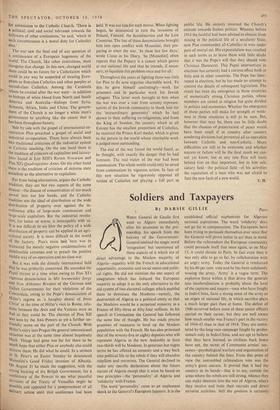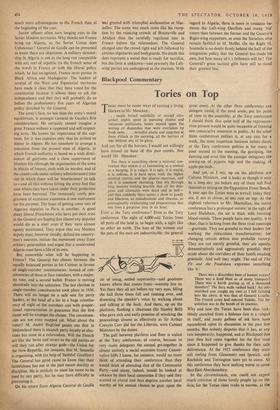Soldiers and Taxpayers
By DARSIE GILLIE Paris WHEN General de Gaulle first went to Algiers immediately after his accession to the pre- miership, his speech from the balcony of the Government- General omitted the magic word 'integration' but mentioned all those aspects of it which are of direct advantage to the Moslem majority of Algeria—equality with the French in educational opportunity, economic and social status and politi- cal rights. He did not mention the one aspect of integration which has induced the European majority to adopt it as the only alternative to the old system of two electoral colleges which enabled them to dominate the Moslems—namely, the destruction of Algeria as a political entity so that the Moslems would be a perpetual minority in a France of fifty-three or fifty-four millions. In his speech at Constantine the General has followed the same line of thought. He has made precise promises of measures to level up the Moslem population with the French. He has also promised that of the seventy-five or eighty deputies who will represent Algeria in the new Assembly at least two-thirds will be Moslems. In generous but vague terms he has offered an amnesty and a way back into political life to the rebels if they will abandon rebellion and terrorism. The General declined to make any specific declaration about the future statute of Algeria except that it must be based on two principles—the 'personality' of Algeria and 'solidarity' with France.
The word 'personality' came as an unpleasant shock to the General's European listeners. It is the established official euphemism for Algerian national aspirations. The word 'solidarity' does not go far in compensation. The Europeans have been trying to persuade themselves ever since that the General will prove better in act than in word. Before the referendum the European community could persuade itself that once again, as on May 13, it could dictate to Paris. in fact even then it was only able to go so far, by collaboration with an angry army. Today the General is reinforced by his 80 per cent. vote and he has been sedulously wooing the army. 'Army' is a vague term. The explosive force within it that drove the generals into insubordination is probably about the level of the captains and majors—men who have fought in Indo-China, have a strong sense of the army as an organ of national life, in which sacrifice plays a much larger part than at home. The defeat of 1940 occurred before most of these junior officers started on their career, but they are well aware how much smaller was France's part in the victory of 1944-45 than in that of-1918. They are embit- tered by the long vain campaign fought by profes- sionals only in Indo-China, and are apt to believe that they have learned, as civilians back home have not, the secret of Communist armies' suc- cesses—psychological warfare and organisation of the country behind the lines. From this point of view the untroubled referendum vote was the army's great success. It proved that it had the country in its hands—that is to say, outside the areas where the rebels are still strong, whence they can make descents into the rest of Algeria, where they receive and train their recruits and direct terrorist activities. Still the position is certainly much more advantageous to the French than at the beginning of the year.
Junior officers often turn longing eyes to the Soviet Moslem territories. Why should not France bring .up Algeria, as the Soviet Union does Uzbekistan? General de Gaulle can be presumed to know there are objections. A military dictator- ship in Algeria is not in the long run compatible with any sort of republic (in the French sense of the word) in. France or with the liberal policy which, he has recognised, France must pursue in Black Africa and Madagascar. The leaders of several of the West and Equatorial territories have made it clear that they have voted for the constitution because it allows them to ask for independence and that they will probably do so before the probationary five years of Algerian policy sketched by the General.
The army's face, no less than the army's moral equilibrium, is amongst General de Gaulle's first considerations. He certainly cannot imagine a great France without a respected and self-respect- ing army. He knows the importance of the cap- tains, for it was captains only that he invited to dinner in Algiers. He has somehow to arrange a transition from the present state of Algeria, in which French authority is based on a wide distri- bution of garrisons and a close supervision of Moslem life (through the organisation of the town in blocks of houses, each with its warden, and of the countryside under military administrators) into one in which there will be 'interlocutors' to talk to—and all this without letting the army feel that men whom they have taken under their protection have been betrayed. The immensely costly pro- gramme of economic assistance is one instrument for his purpose. The hope of getting some sort of Algerian deputies to Paris is another. A good many liberal Frenchmen who have put their trust in the General are hoping that almost any deputies would do as a start even if they were almost openly nominated. They argue that any Moslem deputy must, however timidly, defend his country- men's interests, initiate the movement away from military paternalism and argue that a modernised Algeria must have a life of its own.
But meanwhile what will be happening in France? The General has chosen between the equally balanced parties in his Cabinet in favour of single-member constituencies, instead of con- stituencies of three or four members, with a major- ity vote, and a second ballot. France is moving electorally into the unknown. The last election in single-member constituencies took place in 1936. There will no longer be a safe seat for party leaders, at the head of a list in a huge constitu- ency of eight or ten members and with propor- tional representation to guarantee that the first name will be amongst the chosen. The constituen- cies are not even mapped yet. What about the voter? M. Andre Siegfried points out that in Switzerland there is staunch party loyalty at elec- tions but none in a referendum. Will the French act like the Swiss and revert to the old parties or will they run after strange gods—the Union for the New Republic, for instance, that M. Soustelle is organising, with the help of 'faithful' Gaullists? The General has good cause to know that their faithfulness has not in the past meant docility or discipline. He is unlikely to want his name to be used by any party, but he may have difficulty in preventing it. On his return from Algeria General de Gaulle was greeted with triumphal acclamation at Mar- seilles. The scene was much more like his recep- tion by the rejoicing crowds of Brazzaville and Abidjan than the carefully regulated tour in France before the referendum. The General plunged into the crowd right and left followed by anxious dignitaries and bodyguards. No doubt this does represent a mood that is ready for sacrifice, but the limit is unknown—and precisely the Left- wing parties are endangered at the election. With regard to Algeria, there is more in common be- tween the Left-wing Gaullists and many 'No' voters than between the former and the General's Right-wing supporters, or even the Socialists who remain faithful to M. Monet. On the Right M. Soustelle is no doubt firmly behind the half of the integration policy that the General has made his own, but how many of L:s followers will be? The General's great tactical gifts have still to stand their greatest test.



































 Previous page
Previous page